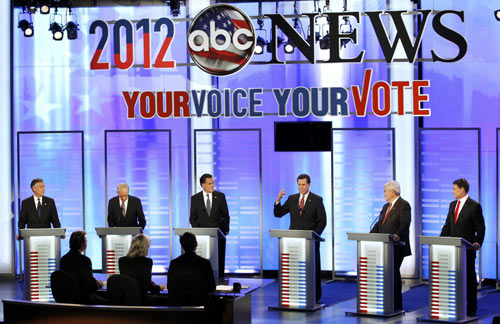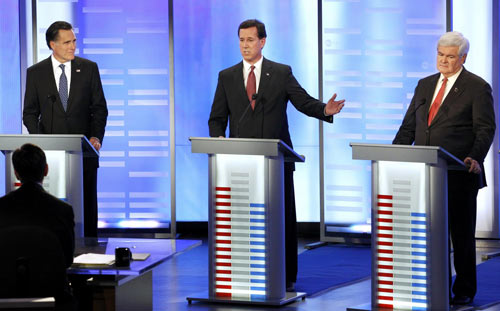
MANCHESTER,?New Hampshire -?A day ahead of the first-in-the-nation primary in New Hampshire, six Republican presidential candidates traded barbs in a high-stake debate, with front-runner Mitt Romney left largely unscathed.
The former Massachusetts governor, who enjoys a double-digit lead over his rivals in the Granite State, was supposed to be in the crosshairs of his colleagues. But this wasn't the case at the debate, which was held at Saint Anselm College in Manchester, New Hampshire.
 |
|
Republican presidential candidates (L-R) former Utah Governor Jon Huntsman, US Rep. Ron Paul (R-TX), former Massachusetts Governor Mitt Romney, former US Senator Rick Santorum (R-PA), former House Speaker Newt Gingrich and Texas Governor Rick Perry participate in a Republican presidential debate at St. Anselm College in Manchester, New Hampshire, Jan 7, 2012. [Photo/Agencies] |
The five candidates sharing the stage with Romney -- former Pennsylvania Senator Rick Santorum, Texas Congressman Ron Paul, former House Speaker Newt Gingrich, Texas Governor Rick Perry and former Utah Governor Jon Huntsman -- seemed content with competing for the silver medal in the race with intense attacks against each other.
In the most heated exchange of the night, Paul accused Santorum, the conservative who ended up in a virtual tie with Romney in the Iowa caucuses, of being "a big-spending individual."
"He's a big government person, along with him being very associated with the lobbyists and taking a lot of funds, and also, where did he make his living afterwards? He became a high-powered lobbyist in Washington, D.C.," the libertarian-leaning candidate said.
"You're not telling the truth," Santorum said. "It's a ridiculous charge, Ron. I'm a conservative, not a libertarian. I believe in some government."
A heated exchange also erupted between Paul and Gingrich, who surged to the top of the polls in late November but lost his brief popularity amid a barrage of attacks from his rivals.
Calling the former speaker a "chickenhawk," Paul, a former flight surgeon in the US Air Force, attacked Gingrich for not having served his country during the war. "People who don't serve when they could and they get three or four, even five, deferments -- they have no right to send our kids off to war," Paul said.
Gingrich defended himself by saying the Texan "has a long history of saying things that are inaccurate and false."
 |
|
Republican presidential candidates (L-R) former Massachusetts Governor Mitt Romney, former US Senator Rick Santorum (R-PA) and former House Speaker Newt Gingrich participate in a Republican presidential debate at St. Anselm College in Manchester, New Hampshire, Jan 7, 2012. [Photo/Agencies] |
The bickering between Paul and Gingrich benefited Romney, who didn't want to see any of his opponents getting more conservative votes to challenge him.
While Romney was also grilled on several issues including his leadership in the private equity firm Bain Capital, no one really dug deep into those charges, leaving the front-runner largely unscathed.
It now seems almost a sure thing that Romney will win New Hampshire given his wide lead and his institutional advantages in the state.
Romney has 44 percent of support from voters who are likely to vote Republican in New Hampshire, a 24-point lead over Paul, who ranks second at 20 percent, according to the latest University of New Hampshire/WMUR poll.
Santorum and Gingrich are tied at 8 percent, with Huntsman at 7 percent. Perry largely skipped the state as he got only 1 percent.
If Romney holds on to New Hampshire, it could possibly give him momentum for the following South Carolina and Florida primaries at the end of January, and then possibly give him the nomination by spring.
But as Iowa has demonstrated, the fact remains that despite being called by many political analysts the "default" Republican nominee, traditional Republican interest groups like Christian Evangelicals and social conservatives continue to reject Romney and instead rally around candidates like Santorum as long as they possibly can.